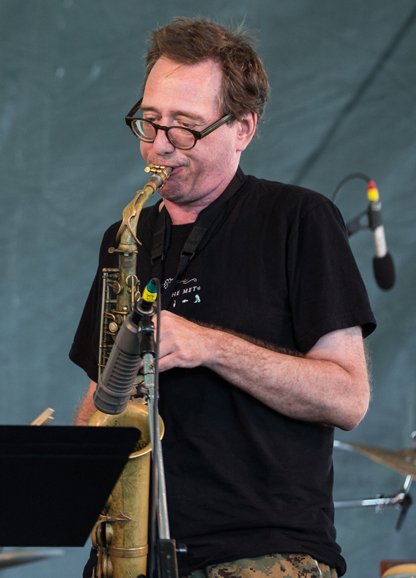John Zorn and Tim Berne (alto sax), Mark Dresser (bass) and Joey Baron (drums). From the album Spy vs Spy: The Music of Ornette Coleman (1989).
Born in New York, John Zorn studied piano, guitar and flute as a child, but at age 16 he switched to alto saxophone. He left university, moved to Manhattan, participated in underground art and played and composed downtown music. In 1976 he started to record albums with his experimental “game pieces”, in which numerous players improvise following certain structural rules, the best known being the 1987’s Cobra. His works with smaller groups appear in 1983’s Locus Solus. He made his first recordings of saxophone solos in The Classic Guide to Strategy Volume 1 in 1983 and The Classic Guide to Strategy Volume 2 in 1986.

He had his first broad success when in 1985 the label Nonesuch published The Big Gundown: John Zorn Plays of Music of Ennio Morricone, in which he provides drastic arrangements of Ennio Morricone soundtracks including elements of soul jazz, traditional Japanese music and other genres. In 1987 he recorded Spillane, in which Albert Collins and the Kronos Quartet participated, and which is a tribute to Mickey Spillane, writer of detective novels. He composed it by writing index cards that contained instructions based on scenes from this literary genre so that musicians would be inspired by them and also by organizing sound blocks that together formed the complete structure of the musical piece.

DISCLAIMER
This composition is atonal and have neither established harmony nor rhythm, that is, each musician plays to his free will. It’s hard music to listen to, so I apologize in advance to those who may dislike it
.
In the introduction, Zorn, Berne and Dresser using the bow play in a compact trio and after a while Baron joins in. Then the group exposes the theme, which is expressive and fast-paced, and right away immerses itself in an intense collective improvisation in which the melody of the theme is sometimes heard, but in which there is total freedom. The interpretation is increasingly exalted and the fury grows until Zorn and Berne coincide in total madness playing sharp phrases. To close, the group re-exposes the theme with energy.
